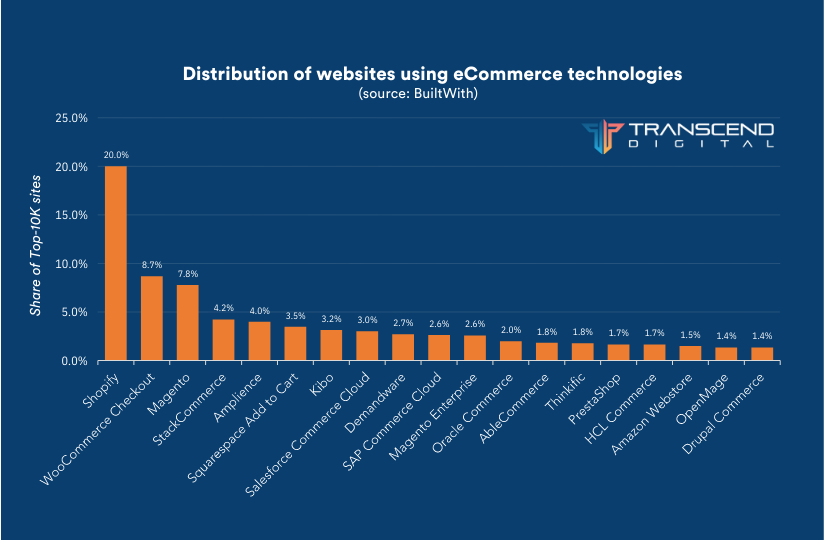
How can we help?
Let's Talk
Your site needs to have strong uptime records. It also needs to have fast site speed on both desktop and mobile (more on mobile optimization below).
Dive deeper: How To Plan And Budget For an eCommerce Platform Migration
We identified four main factors to consider when choosing an eCommerce platform for your business:
- Capacity to handle traffic
- Secure payments and data
- Mobile optimization
- Migration complexity and SEO
Let's dive in!
1. Capacity to handle traffic
Is your traffic growing beyond what your current platform can handle? Does your particular business experience dramatic seasonal spikes in traffic? Find a platform that can not only meet your traffic needs now but have the scalability to work with your projected growth.
eCommerce Platforms: Your Guide to the Top 7
Discover the cream of eCommerce platforms and learn how to choose the right one with our detailed comparison report.
2. Secure payments and data
Protecting your data and that of your customers is never far from your mind. Choose a platform that will help you feel secure in how your payments and data are manages because the alternatives can cost your company. This may be influenced by your choice of a self-hosted or on-premise platform versus a SaaS platform. A self-hosted platform will often provide increased visibility of your data and an understanding of data security. However, a SaaS option will provide security and PCI compliance as part of their monthly fees, handling these important matters while freeing up your resources for other undertakings.
3. Mobile optimization
You may want to make part of focusing in your site performance on optimizing the mobile experience, as more and more consumers are choosing to shop on these mediums.

According to Statista research, 44.7% of eCommerce sales were mobile in 2019, which is projected to grow to 53.9% by 2021. Of course, you know your business best. Take time to study where and how your customers are accessing your site.
Utilizing a headless platform is one-way many enterprise retailers are approaching developing an optimal mobile experience through a flexible front-end capability.
4. Migration complexity and SEO
Despite being a major consideration for most eCommerce businesses, not all enterprise eCommerce platforms handle SEO well. Some platforms do have native features around SEO and migration, while others will require customization and third-party integrations. Create clear specifications for what SEO features you require as part of your platform planning. Your SEO team will probably have a lot of input to include here about what will help search engines to better crawl the site.
Some requirements you may want to consider are: having control over your XML sitemaps, being able to provide page-level metadata, control over redirect management, pagination, etc.
For an enterprise business to perform like you need it to, a number of systems need to work together harmoniously. Whether you’re predominantly B2B or B2C, customer experience is likely a big component of your success. You need to keep customers happy, the website up and available, and logistics like payments and shipping chugging along. You may also be faced with a continual need to implement new tools for marketing, eCommerce, and other teams. And of course, there’s an expectation that everything will work flawlessly with the existing tech stack.
Top eCommerce platforms
Here is a list of some of the best enterprise eCommerce software solutions that currently exist on the market.-Dec-08-2021-05-34-55-67-AM.png?width=608&name=Blog%20Posts%20(4)-Dec-08-2021-05-34-55-67-AM.png) Shopify, WooCommerce and Magento dominate the market, with nearly 40% of top websites using these ecommerce technologies on their sites according to BuiltWith (last updated: November 2021).
Shopify, WooCommerce and Magento dominate the market, with nearly 40% of top websites using these ecommerce technologies on their sites according to BuiltWith (last updated: November 2021).
Final thoughts
As a business at the enterprise level, choosing a new eCommerce platform is a huge undertaking. You not only have to take a number of internal and external stakeholders’ needs into account when choosing an appropriate solution but also sell them on adopting it. While the start of a re-platforming project can feel like a massive integration and technology mountain to climb with many risks and unknowns, by planning and doing thorough requirements gathering from the start, you can choose a platform that is is flexible, extensible, and scalable.
The eCommerce platform landscape is a sea of options if you’re a small or medium-sized business. But for those brands in the enterprise eCommerce space, you may find the number of platforms that can really handle your business needs shrinks considerably. And as an eCommerce business at the enterprise end of the market, achieving your exact requirements is critical. After all, your brand is on the line. You can’t afford to have customer data breaches, periods of site downtime, or a disjointed user experience.





By Alla Elfimova
Director of Marketing. Ex-Publicis, Ex-Millward Brown. 10+ years of experience in Retail, Technology, Telecom, Media & Entertainment industry verticals, driving growth for the brands like Samsung, Verizon, Kohl’s, Twitter and Coca-Cola.